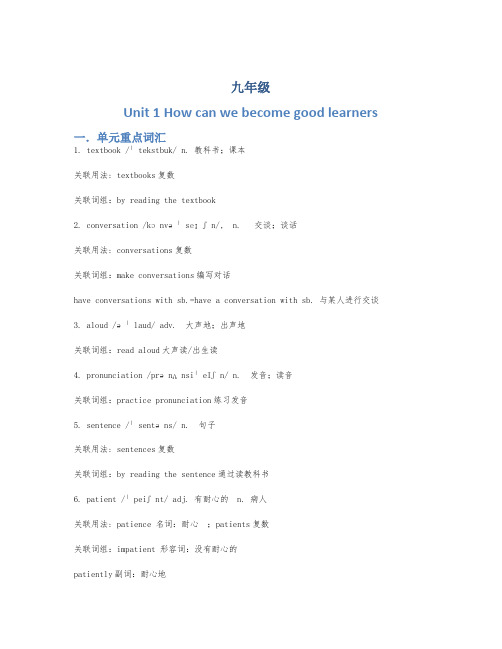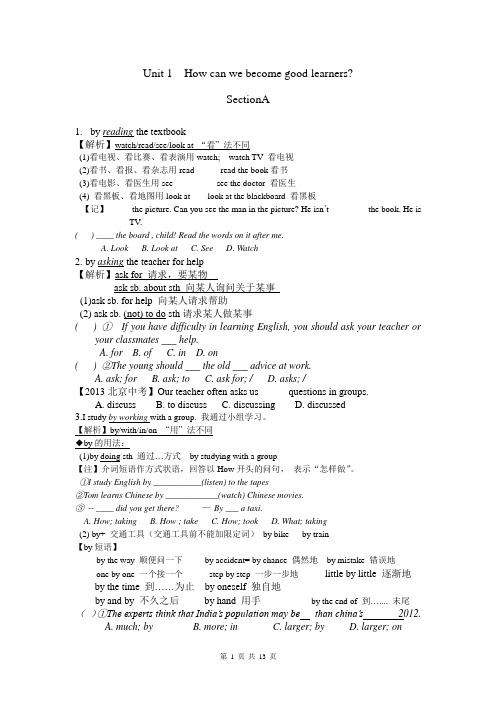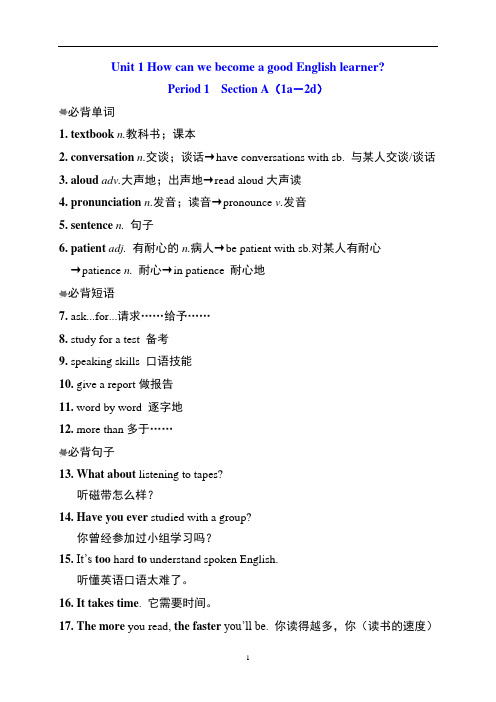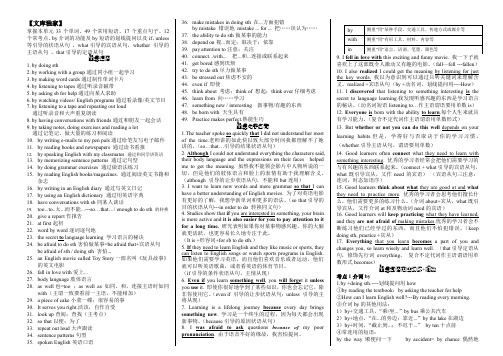人教版九年级英语(Goforit)Unit1知识总结
人教版新目标初三英语九年级第一单元单词语法知识点总结

九年级Unit 1 How can we become good learners一.单元重点词汇1.textbook /ˈtekstbuk/ n. 教科书;课本关联用法: textbooks复数关联词组:by reading the textbook2.conversation /kɔnvəˈs eɪʃn/, n. 交谈;谈话关联用法: conversations复数关联词组:make conversations编写对话have conversations with sb.=have a conversation with sb. 与某人进行交谈3.aloud /əˈlaud/ adv. 大声地;出声地关联词组:read aloud大声读/出生读4.pronunciation /prənʌnsiˈeIʃn/ n. 发音;读音关联词组:practice pronunciation练习发音5.sentence /ˈsentəns/ n. 句子关联用法: sentences复数关联词组:by reading the sentence通过读教科书6.patient /ˈpeiʃnt/ adj. 有耐心的 n. 病人关联用法: patience 名词:耐心;patients复数关联词组:impatient 形容词:没有耐心的patiently副词:耐心地be patient with sb.对某人有耐心be patient of sth.对某事能容忍have (no) patience with…对…(没)有耐心lose patience with 对…失去耐心out of patience 没有耐心7.expression /ikˈspreʃn/ n. 表达(方式);表示关联用法:expressions复数关联词组:facial expressions 面部表情8.discover /dIˈskʌvə (r)/ v. 发现;发觉关联用法:discovery 名词:发现9.secret /ˈsi:krət/ n. 秘密;adj. 秘密的;保密的关联用法:secrets复数关联词组:in secret秘密地;keep a secret保密;a secret plan秘密的计划10.look up (在词典,参考书中或通过电脑)查阅;抬头看11.fall in love with 爱上;与⋯⋯相爱12.grammar /ˈgræmə (r)/ n. 语法关联词组:in grammar在语法方面13.repeat /riˈpi:t/ v. 重复;重做关联用法:secrets复数关联词组:repetition名词:重复14.note /nəut/ n. 笔记;记录 v.注意;指出关联用法:notes复数关联词组:please note 清注意;take notes记笔记15.pal /pæl/ n.朋友;伙伴关联词组:penpal笔友16.physics /ˈfiziks/ n. 物理;物理学关联单词:adj. 物理的;身体的;物质的;根据自然规律的,符合自然法则的关联词组:Space Physics 空间物理学物理空间空间物理17.chemistry /ˈkemistri/ n. 化学关联词组:Organic Chemistry 有机化学18.memorize /ˈmeməˌraɪz/ v 记住;记忆关联单词:memory n.记忆关联用法:过去式 memorized过去分词 memorized现在分词 memorizing第三人称单数memorizes典型例句:Have you memorized your lines for the play yet?你记住剧本中的台词了吗?19.pattern /ˈpætn/, /ˈpætən/ n.模式;方式20.pronounce /prəˈnaʊns/ v. 发音关联用法:过去式 pronounced过去分词 pronounced现在分词pronouncing第三人称单数 pronounces关联词组:Pronounce correctly 发音正确正确发音典型例句:I can not pronounce correctly 我不能正确发音21.increase /Inˈkri:s/ v. 增加;增长关联用法:过去式 increased过去分词 increased现在分词 increasing复数 increases第三人称单数 increasesn. 增加;增多;增长关联词组:increase by 增加了;按…增长on the increase 正在增加,正在增长22.speed /spi:d/ n.速度 v.加速关联单词:speeding超速关联用法:过去式 sped或speeded过去分词 sped或speeded现在分词 speeding关联词组:speed up 加速加快速度使加速加快speed limit 速度限制时速限制限速最高车速23.partner /ˈpa:(r)tnə (r)/ n. 搭档;同伴24.born /bɔːn/ v.出生 adj.天生的关联词组:be born with 天生具有born yesterday 乳臭未干典型例句:Swift was born in 1667.斯威夫特生于1667年。
人教版九年级英语知识点归纳Unit1-5

九年级全一册Unit 1 How can we become good learners? 重点短语和固定搭配Section Awork with sb. 和...合作/一起工作listen to tapes 听磁带ask sb. for help 向某人寻求帮助study for a test 备考study by doing sth. 通过...方法学习have a conversation with sb. 和某人谈话read aloud 大声朗读practice pronunciation 练习发音learn a lot 学到很多speaking skills 口语表达能力spoken English 英语口语finish doing sth. 结束做某事give a report 作报告have a report 听报告at first 一开始first of all 首先,第一be patient 耐心be patient with sb. 对某人有耐心be patient of sth. 忍耐某事the secret to ...的秘诀learn to do sth. 学习做某事so ... that 太...以至于...most of the time 大部分时间be afraid of sth. 害怕某物be afraid to do 因害怕而不敢做because of sth. 由于;因为poor pronunciation 糟糕的发音watch a moviewatch an English moviefall in love with 强调动作性be in love with 强调状态性begin to do = begin doing 开始做某事at the beginning of 在...的开始body language 肢体语言help sb. do sth. = help sb. to do sth.= help sb. with sth. 帮助某人做某事as well 也a piece of cake 小菜一碟It serves you right. 你活该want sth. 想要某物want to do sth. 想要做某事want sb. to do sth. 想要某人做某事look up sth. in a dictionary 查字典have a better understanding of对...有更好的理解the meaning of ...的意思repeat out aloud 大声重复take notes 做笔记do exercises 做练习read a newspaper/ read newspaperskeep a diary in English 用英语写日记Section Bmake mistakes/ make a mistake 犯错误increase to 1,000 增加到increase by 10% 增加了at a speed of = at the speed of 以... 的速度be born with 天生具有the ability to do ......的能力depend on 取决于;若接动词,用V-ing learning habits 学习习惯have ... in common 有共同点be interested in sth./ doing sth. 对...感兴趣pay attention to 注意;若接动词,用V-ing connect ... with 把...与... 联系起来be connected with sth. 与...相连get bored 变得无聊be good at 在...方面做得好;擅长于be good for 对...有好处be good to 对...友善Practice makes perfect. 熟能生巧。
2014秋季新人教版九年级英语unit1知识点归纳解析

Unit 1 How can we become good learners?SectionA1.by reading the textbook【解析】watch/read/see/look at “看”法不同(1)看电视、看比赛、看表演用watch; watch TV 看电视(2)看书、看报、看杂志用read read the book看书(3)看电影、看医生用see see the doctor 看医生(4) 看黑板、看地图用look at look at the blackboard 看黑板【记】______the picture. Can you see the man in the picture? He isn’t ________ the book. He is ______TV.( ) ____ the board , child! Read the words on it after me.A. LookB. Look atC. SeeD. Watch2.by asking the teacher for help【解析】ask for 请求,要某物ask sb. about sth 向某人询问关于某事(1)ask sb. for help 向某人请求帮助(2) ask sb. (not) to do sth请求某人做某事( )①If you have difficulty in learning English, you should ask your teacher or your classmates ___ help.A. forB. ofC. inD. on( ) ②The young should ___ the old ___ advice at work.A. ask; forB. ask; toC. ask for; /D. asks; /【2013北京中考】Our teacher often asks us _____ questions in groups.A. discussB. to discussC. discussingD. discussed3.I study by working with a group. 我通过小组学习。
新人教版九年级英语(全一册)知识点

新人教九年级英语全一册复习Unit1《How can we become good learners?》知识点【短语归纳】1. have conversation with sb. 同某人谈话2. too…to… 太……而不能3. the secret to… ……的秘诀4. be afraid of doing sth./ be afraid to do sth. 害怕做某事5. look up 查阅6. repeat out loud 大声跟读7. make mistakes in 在……方面犯错误8. connect ……with… 把……和……连接/联系起来9. get bored 感到厌烦10. be stressed out 焦虑不安的11. pay attention to 注意;关注12. depend on 取决于;依靠13. the ability to do sth.. 做某事的能力【单元知识点】1. by + doing :通过……方式(by是介词,后面要跟动名词,也就是动词的ing形式)2. talk about 谈论,议论,讨论The students often talk about movie after class. 学生们常常在课后讨论电影。
talk to sb= talk with sb 与某人说话3. 提建议的句子:①What/ how about +doing sth.? 做…怎么样?(about后面要用动词的ing形式,这一点考试考的比较多)如:What/ How about going shopping?②Why don't you + do sth.? 你为什么不做…?(注意加黑的部分用的是动词的原型)如:Why don't you go shopping?③Why not + do sth. ? 为什么不做…?(注意加黑的部分用的是动词的原型)如:Why not go shopping?④Let's + do sth. 让我们做…吧。
人教版九年级英语上册各单元知识点梳理

Unit 1 How can we become a good English learner?Period 1 Section A(1a-2d)必背单词1.textbook n.教科书;课本2.conversation n.交谈;谈话→have conversations with sb. 与某人交谈/谈话3.aloud adv.大声地;出声地→read aloud大声读4.pronunciation n.发音;读音→pronounce v.发音5.sentence n. 句子6.patient adj. 有耐心的n.病人→be patient with sb.对某人有耐心→patience n. 耐心→in patience 耐心地必背短语7. ask...for...请求……给予……8. study for a test 备考9. speaking skills 口语技能10. give a report做报告11. word by word 逐字地12. more than多于……必背句子13. What about listening to tapes?听磁带怎么样?14.Have you ever studied with a group?你曾经参加过小组学习吗?15.It’s too hard to understand spoken English.听懂英语口语太难了。
16. It takes time. 它需要时间。
17.The more you read, the faster you’ll be.你读得越多,你(读书的速度)就会越快。
Period 2 Section A(3a-3b)必背单词1. expression n.表情;表示;表达方式→express v.表达;表露→adj. 特快的→an express train 特快列车2.discover v. 发现;发觉→discovery n.发现→discoverer n. 发现者3.secret n.秘密;秘诀→keep a secret保守秘密→the secret to/of success成功的秘密→secret adj.秘密的;保密的→secret news 秘闻4. grammar n.语法必背短语5. be afraid to do sth.不敢做某事→be afraid of doing sth.害怕做某事6. because of 因为7. fall in love with 爱上……8. look up (在词典或参考书中)查阅;抬头看→look it /them up查阅它/它们→look up to sb.仰慕某人=admire sb.必背句子9. The teacher spoke so quickly that I did not understand her most of the tim老师说得太快,以至于很多时候我都听不懂她(说的话)。
2020人教新目标版九年级英语上unit1单元知识点(短语+句型+重难点句子+语法)

【文库独家】掌握本单元33个单词、49个常用短语、17个重点句子、12个常考点。
by介词的功能及by短语的划线提问以及if、unless 等引导的状语从句,what引导的宾语从句,whether 引导的主语从句,that引导的定语从句重点短语1.by doing sth2.by working with a group通过同小组一起学习3.by making word cards通过制作单词卡片4.by listening to tapes通过听录音磁带5.by asking sb for help通过向某人求助6.by watching videos/ English programs通过看录像/英文节目7.by listening to a tape and repeating out loud通过听录音和大声重复朗读8.by having conversations with friends通过和朋友一起会话9.by taking notes, doing exercises and reading a lot通过记笔记、做大量的练习和阅读10.by writing e-mails to my pen pals通过给笔友写电子邮件11.by reading books and newspapers 通过读书看报12.by speaking English with my classmates 通过和同学讲英语13.by memorizing sentence patterns 通过记句型14.by doing grammar exercises 通过做语法练习15.by reading English books/magazines. 通过阅读英文书籍和杂志16.by writing in an English diary 通过写英文日记17.by using an English dictionary 通过用英语字典18.have conversations with sb同某人谈话19.too...to..太...而不能...---so…that…/ enough to do sth 的转换20.give a report作报告21.at first起初22.word by word逐词逐句地23.the secret to language learning 学习语言的秘诀24.be afraid to do sth害怕做某事=be afraid that+宾语从句be afraid of sth / doing sth 害怕…25.an English movie called Toy Story一部名叫《玩具故事》的英文电影26.fall in love with爱上...27.body language肢体语言28.as well也=too ;as well as 如同、和,连接主语时如同with(主谓一致要看前一主语,不能相加)29. a piece of cake小菜一碟;很容易的事30.It serves you right.活该,自作自受31.look up查阅;查找(主考点)32.so that以便;为了33.repeat out loud大声跟读34.sentence patterns句型35.spoken English英语口语36.make mistakes in doing sth 在...方面犯错by mistake 错误地mistake … for …把……误认为……37.the ability to do sth做某事的能力38.depend on视...而定;取决于;依靠39.pay attention to注意;关注40.connect...with... 把...和...连接或联系起来41.get bored感到厌烦42.try to do sth尽力做某事43.be stressed out焦虑不安的44.even if 即使45.think about 考虑;think of 想起;think over仔细考虑46.learn from 向……学习47.something new / interesting 新事物/有趣的东西48.be born with 天生具有49.Practice makes perfect.熟能生巧重点句子必背1.The teacher spoke so quickly that I did not understand her mostof the time.老师讲的如此快以致大部分时间我都理解不了她讲的。
Unit 9(Section A Grammar)九年级英语全一册(人教新目标Go For It!)
名词做定语
5.The ipad there is mine.
副词做定语
6.The boy to take the ball is my son. 不定式做定语
7.I have a friend called Bob.
分词做定语
8.He likes music that isn't too loud. 定语从句做定语
练一练
人 1. The boy _w__h_o__/t_h_a_t___ is playing ping-pong
is my classmate.
物 2. The e-mail _w__h_ic__h_/_th_a__t I received yesterday
was from my sister.
1
3
思维品质:学会谈论自己的喜好。 通过表达个人喜好,提高学生欣 赏美的水平。
文化意识:能对自己看过的书籍,
电影,听过的CD等进行简单的
描述,能运用本单元词汇和定语
从句表达自己的喜好类型和感受。
2
4
学习能力:本单元内容以“音乐
和电影”为话题展开,让学生讨论 自己喜欢的类型及自己的感受,进 而呈现了本单元的重点语言结构— 定语从句,要求学生能用本单元的 词汇和定语从句的功能谈论自己的 喜好。
Unit 9 I like music that I can dance to. Section A Grammar Focus
Language goals
语言能力:(1)进行一步复习巩固学
习Section A 部分所学的生词和词组。 (2)掌握如何表达自己喜好的句型。 (3)掌握that/which/who引导的定语从句的 用法。
人教版九年级英语上册各单元知识点总结
Unit1 How can we become good learners?【短语归纳】【短语归纳】1. have conversation with sb. 同某人谈话同某人谈话2. too…to… 太……而不能而不能3. the secret to… ……的秘诀的秘诀4. be afraid of doing sth./ be afraid to do sth. 害怕做某事害怕做某事5. look up 查阅查阅6. repeat out loud 大声跟读大声跟读7. make mistakes in 在……方面犯错误方面犯错误8. connect ……with… 把……和……连接/联系起来联系起来 9. get bored 感到厌烦感到厌烦10. be stressed out 焦虑不安的焦虑不安的11. pay attention to 注意;关注注意;关注12. depend on 取决于;依靠取决于;依靠13. the ability to do sth.. 做某事的能力做某事的能力【单元知识点】【单元知识点】1. by + doing :通过……方式方式(by 是介词,后面要跟动名词,也就是动词的ing 形式)形式)2. talk about 谈论,议论,讨论谈论,议论,讨论The students often talk about movie after class. 学生们常常在课后讨论电影。
讨论电影。
talk to sb= talk with sb 与某人说话与某人说话3. 提建议的句子:提建议的句子:①What/ how about +doing sth.? 做…怎么样?(about 后面要用动词的ing 形式,这一点考试考的比较多)形式,这一点考试考的比较多)如:What/ How about going shopping?②Why don't you + do sth.? 你为什么不做…?(注意加黑的部分用的是动词的原型)分用的是动词的原型)如:Why don't you go shopping?③Why not + do sth. ? 为什么不做…?(注意加黑的部分用的是动词的原型)是动词的原型)如:Why not go shopping?④Let's + do sth. 让我们做…吧。
九年级英语全一册(1-14单元)知识点归纳
新人教版九年级英语全册知识点归纳及习题(最新)Unit 1 How can we become good learners?一、短语总结:1. good learners 优秀的学习者2. work with friends 和朋友一起学习3. study for a test 备考4.have conversations with 与……交谈5.speaking skills 口语技巧6.a little 有点儿7.at first 起初;起先8.the secret to......,.......的秘诀9.because of 因为10.as well 也11.look up (在词典中等)查阅;抬头看12.so that 以便,为了13.the meaning of ……的意思14.make mistakes 犯错误15.talk to 交谈16.depend on 依靠;依赖17.in common 共有的18.pay attention to 注意;关注19.connect ……with ……把……联系。
20.for example 例如21.think about 考虑22.even if 即使;尽管;纵容23.look for 寻找24.worry about 担心担忧25.make word cards 制作单词卡片26.ask the teacher for help 向老师求助27.read aloud 大声读28.spoken English 英语口语29.give a report 作报告30.word by word 一字一字地31.so……that 如此……以至于32.fall in love with 爱上33.something interesting 有趣的事情34.take notes 记笔记35.how often 多久一次36.a lot of 许多37.the ability to do sth. 做某事的能力38.learning habits 学习习惯39.be interested in 对……感兴趣40.get bored 感到无聊41.be good at 在……方面擅长42.be afraid of 害怕43.each other 彼此互相44.instead of 代替而不是二.用法集萃1. by doing sth. 通过做某事2.it +be+adj.+to do sth. 做某事是……的3.finish doing sth. 完成某事4.what about doing sth.?做某事怎么样?5.try to do sth. 尽力做某事6.the +比较级,the+比较级越……,就越……7.find it+adj.+to do sth. 发现做某事8.be afraid of doing sth. 害怕做某事9.help sb. (to) do sth. 帮助某人做某事10.practice doing sth. 练习做某事11.keep doing sth. 一直做某事12.be afraid to do sth. 害怕做某事13.begin to do sth. 开始做某事14.want to do sth. 想要做某事15.need to do sth. 需要做某事16.remember to do sth. 记得做某事17.shoot 射(射着,射死等表结果)18.shoot at(瞄准)射Unit1 检测题一.单项选择1.—_______ do you study English? —By listening to tapes.A. HowB. WhereC. WhenD. Why2.You can improve your English practicing more. A.by B.with C.of D.in3. Why not practice your _________English in _________ English-speaking country?A. speaking, aB. speaking, anC. spoken, an4. ______conversations with others is one of the secrets to _____a successful learner.A. Practice, becomeB. Practice, becomingC. Practicing, becoming5 ---There’re a few new words in the article? ---What about _________in your dictionary? A. looking it up B. looking up it C. looking them up6. We’ll go out to play ______ it rains tomorrow. A. so B. unless C. because7. Can you __which is the right answer to the question? A. look for B. find C. find out8. Jenny used to be afraid to ________in class, so she always ________nothing.A. speak, talkedB. speak, saidC. say, spoke9.— Why not listen to BBC news to improve your listening skills?—It’s ______ difficult _____ I can’t follow. A. too; to B. so; that C. such; that10. A good learner often thinks about ________he needs to practice more.A. thatB. whatC. how11.--I’m g oing to listen ____the tape. --OK. Remember to listen ____the key words.A. to, toB. to ,forC. for, to12. ________or not you can learn well depends on your learning habits.A. IfB. WeatherC. Whether13. I have finished _________my report. May I start to learn ________the guitar?A. writing, playingB. writing, to playC. to write, playing14. ---I often make mistakes ____grammar. ---Why not ask your teacher ____help?A. in, toB. in, forC. at, to15. _________write down the new words in your notebook?A. Would you likeB. How aboutC. Could you please16. ---Jack used to have ____writing practice. ---Yes, and he had learned ______.A. a lot of, a lot ofB. a lot of, a lotC. a lot, a lot of17. The more careful you are, ________mistakes you’ll make.A. fewerB. the fewerC. the less18. G ood learners aren’t afraid _____mistakes. Instead, they learn ________mistakes.A. of making, inB. to make, fromC. to make, in19. For the first time, pay attention _________quickly to get the main ideas.A. to readB. readingC. to reading20.I discovered that listening to is the secret language learning.A. something interesting, toB. interesting something, toC. something interested, ofD. interested something of21.Jenny found it very easy English well.A. learningB. to learnC. learnD. learned22. He_____ with the girl with golden hair and will soon get married____ her.A. falls in love; toB. is in love; toC. loves; withD. loves; to23. My father thinks _____ is a great way to learn English.A. study grammar.B. I study grammar.C. studying grammar.D. studies grammar24 Why not ___ your teacher for help when you can’t finish _____ it by yourself?A. ask; writeB. to ask; writingC. ask; writingD. asking; write25. — I wonder if I can learn English well.—. All things are difficult before they are easy.A. I am afraid soB. You’re slowC. It takes timeD. It’s a piece of cake26 You’ll find _____________ easy to learn it well. A. that B. its C. it D. this27. –I don’t have a partner to practice English ______________.---Why not join an English language club to practice _______________?A. /; speakingB. with; to speakC. /; to speakD. with; speaking28. ---She hardly makes mistakes _________English grammar.---No, it seems that she was born ________the ability to learn languages.A. in, withB. with, inC. in, inD. with, with二用所给单词的适当形式填空。
九年级英语全一册(人教新目标GoForIt!)Unit11第1课时(SectionA1a2d)说课稿
(1)句型Can you make friends with me?的运用;
(2)一般现在时和一般将来时的区分;
(3)如何引导学生正确看待友谊,与人建立良好的关系。
二、学情分析
(一)学生特点
本节课所面向的学生为九年级学生,他们的年龄大约在14-15岁之间。这一年龄段的学生具有以下特点:他们正处于青春期,思维活跃,好奇心强,对新鲜事物充满兴趣,但注意力容易分散。在认知水平上,他们已经具备了一定的英语基础,能够理解和运用基本的英语词汇和句型。在学习兴趣方面,学生对英语学习有着较高的热情,尤其是能够用英语进行实际交流时。然而,他们的学习习惯可能存在一定的问题,如学习计划性不强,自主学习能力有待提高,需要更多的引导和激励。
(3)通过实践活动,提高学生的英语实际运用能力。
3.情感态度与价值观目标:
(1)培养学生尊重他人,关爱朋友的品质;
(2)引导学生正确看待友谊,学会与人交往;
(3)激发学生对英语学习的兴趣,增强自信心。
(三)教学重难点
1.教学重点:
(1)词汇和句型的掌握;
(2)一般现在时和一般将来时的运用;
(3)友谊观的正确表达。
本节课我将采用以下主要教学方法:
1.情境教学法:通过设置真实的语言环境,让学生在实际情境中学习英语,提高他们的语言应用能力;
2.任务型教学法:设计具体的学习任务,引导学生通过完成任务来学习和实践语言;
3.合作学习法:组织小组活动,鼓励学生之间的交流和合作,共同完成任务;
4.交际教学法:通过模拟真实的交际场景,培养学生的交际能力。
九年级英语全一册(人教新目标GoForIt!)Unit11第1课时(SectionA1a2d)说课稿
一、教材分析
- 1、下载文档前请自行甄别文档内容的完整性,平台不提供额外的编辑、内容补充、找答案等附加服务。
- 2、"仅部分预览"的文档,不可在线预览部分如存在完整性等问题,可反馈申请退款(可完整预览的文档不适用该条件!)。
- 3、如文档侵犯您的权益,请联系客服反馈,我们会尽快为您处理(人工客服工作时间:9:00-18:30)。
Unit 1 How do you study for a test?一、[重点词组](Key Phrases)1. not at all 一点也不2. end up (doing) sth. 结束做某事3. make mistakes 犯错4. later on 后来5. be afraid to do 害怕做某事6. laugh at 嘲笑(某人)7. take notes 作笔记8. enjoy doing sth. 喜欢做某事9. native speaker 说本族语的人10. make up 组成11. the best way to do…做某事最好的办法12. begin with 首先13. write down 写下,记下14. on one’s way to 在某人去某地的路上15. once more 又一次,再一次16. first of all 首先二、[重点句型](Target Language)1. How do you study for tests? Well, I study by working with my classmates.2. Have you ever studied with a group? Yes, I have. I’ve learned a lot that way.3. I don’t have a partner to practice English with me. Maybe you should join an English club.4. What about reading aloud to practice pronunciation?5. Why don’t you join an English language club?三、重点难点:1. V.+by + Sth或doing sth(by后面可以加名词或动名词短语)通过……方式如:I learnt English by studying with a groupby 还可以表示:By是个很常用的介词(有时也用作副词),在初中英语中的用法有以下几种:(1)意为“在……旁”、“靠近”。
如:有的在大树下唱歌跳舞,有的在湖边画画儿。
Some are singing and dancing under a big tree. Some are drawing by the lake.(2)意为“不迟于”、“到……时为止”。
如Your son will be all right by supper time. 你的儿子在晚饭前会好的。
(3)表示方法、手段,可译作“靠”、“用”、“凭借”、“通过”、“乘坐”等(4)用于被动句中,表示行为主体,常译作“被”、“由”等(5)组成其它短语。
1) by the way : 意为“顺便说”、“顺便问一下”,常做插入语By the way , where’s Li Ping , do you know? 顺便问一下,李平在哪儿。
你知道吗?2) by oneself : 意为“单独”、“自行”。
如:I can’t leave her by herself. 我不能把她单独留下。
3) by and by : 意为“不久以后”、“不一会儿”。
如:But by and by , more and more people began to study English. 但是不久以后,越来越多的人开始学英语了。
2. talk about 谈论,议论,讨论如:The students often talk about movie after class. talk to sb. === talk with sb. 与某人说话3. 提建议的句子:①What/ how about +doing sth.?如:What/ How about going shopping?②Why don’t you + do sth.? 如:Why don’t you go shopping?③Why not + do sth. ? 如:Why not go shopping?④Let’s + do sth. 如:Let’s go shopping⑤Shall we/ I + do sth.? 如:Shall we/ I go shopping?4. a lot 许多修饰名词,常用于句末如:I eat a lot. 我吃了许多。
A lot of= lots of许多,修饰名词。
5. too…to 太…而不能常用的句型too+adj./adv. + to do sth.如:I’m too tired to say anything. 我太累了,什么都不想说。
同义句:so+ adj./adv.+that从句I’m so tired that I can’t say anything.not+ adj./adv.+enough+ to do sth. I’m not strong enough to say anything.6. not …at all 一点也不根本不not经常可以和助动词结合在一起,at all 则放在句尾7. be / get excited about sth.= be / get excited about doing sth. = be excited to do sth. 对…感兴奋8. ①end up doing sth 终止做某事,结束做某事如:②end up with sth. 以…结束如:10. first of all 首先. to begin with 一开始later on 后来、随11. also 也、而且(用于肯定句)常在句子的中间either 也(用于否定句)常在句末too 也(用于肯定句) 常在句末12. make mistakes 犯错make a mistake 犯一个错误13. laugh at sb. 笑话;取笑(某人)14. take notes 做笔记,做记录15. enjoy doing sth . 喜欢做…乐意做…如:enjoy oneself =have a good time 过得愉快16. native speaker 说本族语的人17. make up 组成、构成18. one of +(the+ 形容词比较级)+名词复数形式…其中之一19. It is +形容词+(for sb. ) to do sth. (对于某人来说)做某事…如:It’s difficult (for me ) to study English.对于我来说学习英语太难了。
sb find It is(要省略)+形容词+(for sb. ) to do sth 某人发觉做某事…I find it difficult (for me ) to study English.20. practice doing 练习做某事如:21. decide to do sth. 决定做某事如:22. unless 假如不,除非引导条件状语从句23. deal with 处理如:I dealt with a lot of problem.24.worry about sb./ sth. 担心某人/ 某事25.be angry with sb. 对某人生气如:26. go by (时间) 过去如:Two years went by. 两年过去了。
27. see sb. / sth. Doing sth 看见某人正在做某事强调正在发生see sb. / sth. Do sth 看见某人做完某事如:28. each other 彼此We should help each other.30. regard…as …把…看作为…. 如:The boys regarded Anna as a fool. 这些男孩把安娜看成傻瓜。
31. too many许多修饰可数名词如:too many girlstoo much许多修饰不可数名词如:too much milkmuch too太修饰形容词如:much too beautiful32.change…into…将…变为…33.with the help of sb. == with one’s help 在某人的帮助下pare … to …把…与…相比35. instead 代替用在句末,副词(字面上常不译出来)instead of sth. / doing sth. 代替,而不是用在句中36.have trouble doing sth.表示“做某事有困难。
”eg: I had trouble climbing the mountain.37.however与but二者都意为“可是,但是”;but是并列名词,连接两个并列分句,上下二句在总的意义上构成了对比。
but之后一般不使用逗号。
I really don't like cheese, but I will try just a little this time.我实在是不喜欢吃奶酪,但是这次我要尝一点。
however不能直接连接两个分句,必须另起新句,并用逗号隔开。
however 在位于分句之首时,通常用逗号;位于分句之中时,通常在其前后各加一个逗号;位于分句之尾时,则必须在其前加逗号。
It was raining hard. However, we went out to look for the boy. 雨下得很大,不过我们还是出去寻找那个孩子。
38. join/join in/take part injoin 意为“加入某一种组织,成为其中一员(become a member of)”。
join 后面还可接表示人的名词或代词,表示加入到某人或某些人的活动中去。
如:My uncle joined the Party in 1978.我叔叔是1978年入党的。
We are going for a swim.Will you come and join us?我们要去游泳,你来同我们一起去好吗?join in 表示“加入”,“参与”某种活动,in 之后可接名词或动名词。
表示“参加某人的活动”可以说join sb,in(doing)sth.。
如:he joined them in the work.他同他们一起工作。
take part in 表示“参加某种活动”,与join in 同义,一般可以互相替换,但“参加会议”多用take part in。
